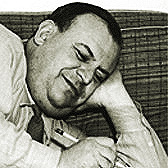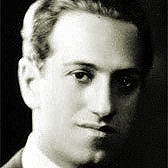
Revered Broadway and film composer
Burton Lane
InducteeThree term ASCAP President
* Burton Lane was also the 1998 recipient of The Johnny Mercer Award, the SHOF’s highest honor
Burton Lane, long one of popular music’s most revered songwriters, is one of the few American composers to have proved equally adept and successful in writing for both Broadway and motion pictures. Few other songwriters have criss-crossed the nation so often and so productively between Hollywood and New York.
His professional life began in 1927, when at age 15, he signed a contract with the Remick Music Company, a leading music publisher. Two years later, a major event for the then 17-year-old, was a chance to perform some of his tunes for George and Ira Gershwin, who offered their encouragement. Ira Gershwin also introduced Lane to E.Y. (Yip) Harburg, and years later, as luck would have it, Lane and Harburg collaborated on one of the great Broadway scores, for the hit show, "Finian's Rainbow."
During the '30s, Lane composed for four different musical revues, working with Howard Dietz on two songs for "Three's a Crowd," and with Harold Adamson on one song for "The Third Little Show," two songs for "Singin' in the Rain," and virtually the entire score for the ninth edition of Earl Carroll's "Vanities."
In 1933, Lane had his first opportunity for writing film music, and with collaborator, Harold Adamson, came up with the memorable song, "Everything I Have Is Yours," for MGM's "Dancing Lady," with Clark Gable and Joan Crawford. The following year, what history would show as a momentous event in Lane's career came when he discovered an 11-year-old, Frances Gumm. He brought the girl to MGM executives and he played for her audition. She was signed almost immediately and was soon using her new name, Judy Garland.
For the next 20 years, with the exception of a few interruptions for Broadway assignments, Lane focused on movie music, writing overall for more than 30 motion pictures. Just before the outbreak of World War II, he and Yip Harburg again collaborated, this time on the hit musical, "Hold on to Your Hats," the last show in which the great A] Jolson was to star.
Burton Lane received his first Oscar nomination for the song, "How About You," sung in the movies, "Babes on Broadway," by Mickey Rooney and the now grown up and established star, Judy Garland, whom Lane had discovered years before.
Lane commenced work in 1944 on a musical score for the Olson and Johnson Broadway revue, "Laffing Room Only," with Al Dubin scheduled to write the lyrics. Dubin, however, became ill and passed away, leaving Lane to supply lyrics to his own melodies. The song, "Feudin' and Fightin'," based on a title suggested by Dubin, became the big hit from the show and Dubin and Lane were both credited.
In 1946, another great collaboration between Lane and E.Y. Harburg took place, when the pair turned out the score for "Finian's Rainbow," which resulted in eight songs of the total of 11, including "How Are Things in Glocca Morra" and "Old Devil Moon," becoming major hits and long-living standards.
Soon after the triumph of "Finian's Rainbow," yet another successful collaboration took shape, this time with Alan Jay Lerner, in a score for the Fred Astaire and Jane Powell movie hit, "Royal Wedding," which also produced Lane's second Oscar nomination, for the song "Too Late Now."
In addition to his many songwriting projects, Lane also took on a new assignment in 1957, that of president of The American Guild of Authors and Composers, an organization dedicated to supporting and furthering the interests of songwriters. He served in the post for 10 terms and in 1966, the Guild, in appreciation for his service on behalf of his fellow songwriters, bestowed upon him its first Sigmund Romberg Award. Lane was especially pleased by the honor, since it came to him as an expression of his peers.
In 1963, the Lane and Lerner team was reactivated, this time producing another memorable score, for the show "On a Clear Day You Can See Forever," which won the team a Grammy for best original cast album. Lane served three terms on the Board of Directors for the American Society of Composers, Authors and Publishers and was a Songwriters' Hall of Fame inductee in 1971.
Burton Lane died at age 85. He was survived by his wife Lynn; a daughter from his first marriage, Diana Lane of Manhattan, and three step-daughters, Elizabeth and Peggy Kaye of Manhattan and Hillary Kaye of Los Angeles.








